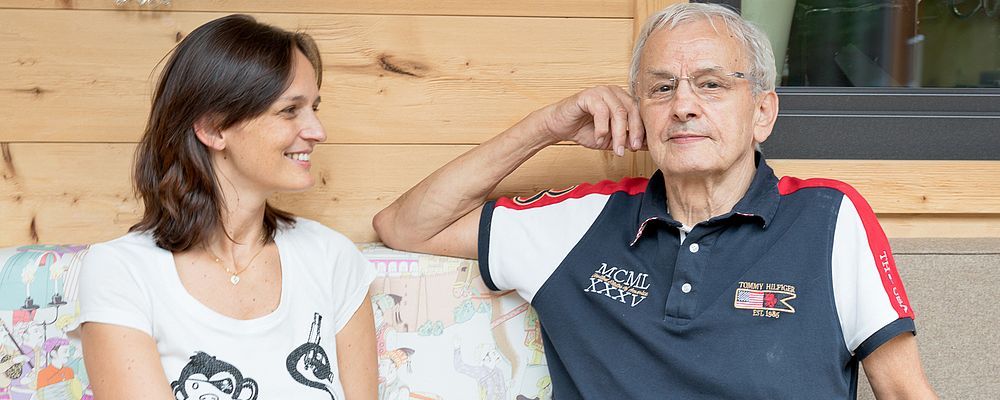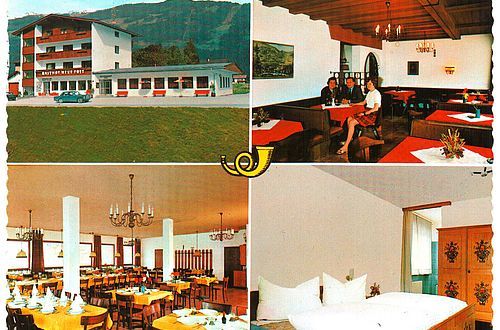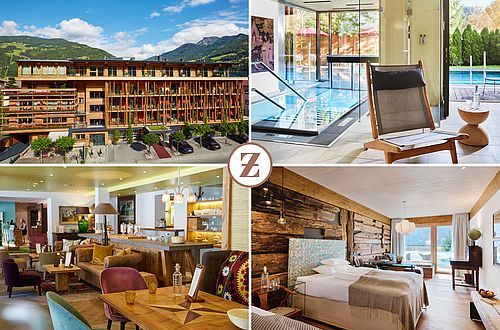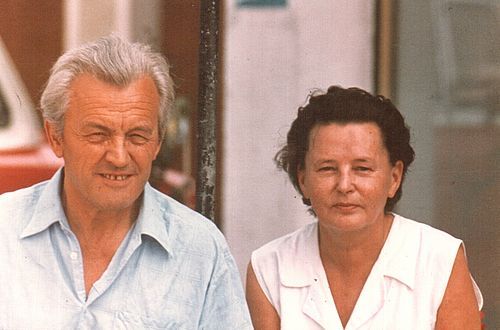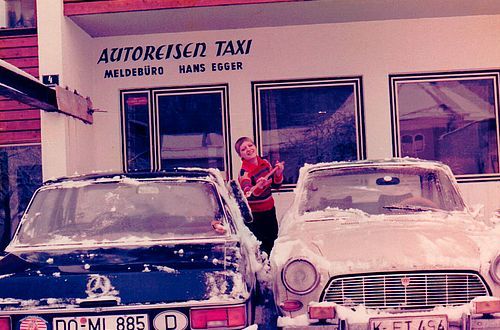The Egger Family
A life’s work - Christina and Hans in interview
The wonderful thing about a family business is that you grow into your responsibilities. And you get the chance to learn how to do it differently, or even better. We interviewed Christina Binder-Egger and her father Hans to find out how their family life changed with the ZillerSeasons.
JOURNAL: Hans, you and your wife Luise managed and built up the Gasthof Neue Post for thirty years from 1979 to 2009. How big was the hotel in the earlier days?
HANS: In 1977 we built three floors above the dining area but developed and furnished only two of them. A few years later we finished the third floor and added eight rooms. A higher standard three or four star room in those days simply meant having a restroom and either bath or shower facilities. In the old rooms, we only had sinks for washing. By the time I handed over the business to Christina, we had 35 small rooms with 80 beds. Everything was thirty years old, although I have to say well-maintained. But we really needed an upgrade in terms of facilities and comfort.
CHRISTINA: The big question for me was – what do I do with the house [laughs]? Even back in 2005 we had plans for a renovation, but we weren’t sure about the direction we should take. I was very aware that it was going to cost a crazy amount of money to transform the hotel. I didn’t want a hotel, or a restaurant, or even a bar. As much as I love my parents and spending time with them, as a child I had to get used to not having my mother and father for myself. Not even for breakfast or dinner, or the school ball. Christmas? No. Father Christmas, or the “Christkind“ as we say in Austria, always came at 10:30 in the evening. And there was always this financial pressure. You had to keep on investing to attract new guests.
So you didn’t really want to take over the business. What changed your mind?
CHRISTINA: In 2008, my husband took me to the Hahnenkammrennen, a famous ski-race in Kitzbühel, Tyrol. And then I got a phone call from home saying that our waitress had disappeared. What do we do? That was the moment when my husband said to me, enough! We’re done talking about this, we start renovating in the new-year! But we also decided that we were only going to take on this monster project if we could do it our way, to our expectations. So over the years we started on this journey to develop the hotel as we have it today: a four-star superior hotel with an award winning restaurant, as well as a boutique spa, and forty employees. We have a similar amount of beds compared to what my parents had, but these days we also have apartments with large suites and SkyLofts. Then, under the umbrella of ZillerSeasons, came a further expansion with the ZillerLodge and the HochLeger chalets. Which, combined with the MartinerHof and new tree-lofts, are turned into a luxury resort.
How did you get started after you made the big decision to take over the hotel?
CHRISTINA: A well-respected tourism consultant did an analysis for us and laid out our options. We expected a concrete plan how we should renovate and a business plan. Half of the report he prepared however was about the tourism industry in the Zillertal area and benchmarking the hotels against each other. He just wanted to say: this is a tough market to be successful in. The consultant didn’t provide us with a target-market, or how we should position ourselves to stand out. The report landed in the bin. So we took the matter into our own hands. Through a contact of my husband Reinhard, we got to know the very talented Thomas Urthaler, who at the time had just graduated in woodwork architecture and construction. Later on he became our architect for the entire modification of the building. We decided not to have a bar or kitchen at the time, but to build self-catering apartments. The difference was that we wanted something high-level, refined, luxury standard – a concept which didn’t exist at the time here. “Serviced Apartments” were also in low supply in Zillertal. And then over time and under these new circumstances, I started to fall in love again with being a hotelier and my work.
Was the new hotel concept successful from the beginning?
CHRISTINA: Fortunately, yes. We received an inquiry from the football club Werder Bremen and since then they regularly stay here during their summer training camps. But to keep them and also our autumn guests happy, we needed a restaurant. So we moved the bar and built a kitchen. It forced us to take the next big step to meet the expectations of our guests. It was also then when we started to get more ambitious and have fun thinking up ideas and started saying, ‘this would be really cool’ or ‘hey, this would look so beautiful’. We wanted to impress our guests more and more. That thinking is how the HochLeger chalets came about, for example.
How would you describe your “Work-Life Balance”? How is it different now than in the past?
HANS: We had minimal free time, but the maximum amount of responsibilities. I made breakfast, then I went into the office and dealt with the invoices and inquiries. I wrote out offers to guests on the type machine and then brought letters to the post office. After that, I went to the kitchen and made lunch. We had a typical Austrian menu, with around twenty dishes. After lunch I had a two hour break and went back to the kitchen and cooked for sixty to seventy people. I had two assistants, but I was the chef and checked everything. I tasted the soup. I bought every kilogram of sugar, if you know what I mean. It was ten o’clock in the evening before we were finished. My wife worked until around midnight, sometimes until four in the morning. We worked hard, but didn’t complain.
CHRISTINA: I've learnt a lot from my parents and their generation, as well as from my husband whose support and management know-how has been an incredible help. But today, we work a lot differently. We invest a lot of time on our staff. We also put a lot of value and money into training apprentices. Because of that we have people with positions of responsibility and support that we can rely on. The operational side of the business runs, whether I’m there or not. The administrative side of the business though has increased exponentially. Nowadays we deal with eighty room inquiries a day. Back then we dealt with eight to ten, although they were concrete requests. From one inquiry, you normally had a booking. These days you get one or two bookings from those eighty requests [laughs]. We also have many more industry and legal standards to cope with – health and safety, documenting allergy requirements, hygiene. I look after all of these myself. Before, your work was mainly operational with hardly any administration. These days I delegate the daily work to my staff and do the admin myself, which has quite simply exploded in size.
HANS: I regret that the penny didn’t drop earlier. For guests we did everything – to our cost. We overdid it. We thought: the more responsibility you took, the more you were appreciated as a host. But that’s wrong. You need good people around you and you have to concentrate on the important things instead. Which also means your family.
CHRISTINA: Of course there are exceptions, but I appreciate always being able to have dinner with my husband and the children. I wouldn’t want it any other way. I will always run here and there and help out in the hotel – I love my work, I really do. And I am lucky today that I can be there for my family.
